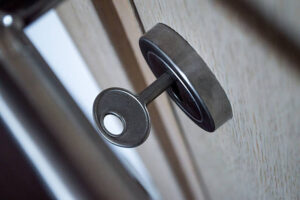The Ultimate Guide to Choosing High-Security Door Locks for Your Home
Choosing the right high security door locks can feel like picking a needle out of a haystack. There are so many options, and it’s easy to get lost in the sea of choices. But don’t worry; I’ve got your back! Let’s break down what you need to look for: material, strength, and durability.
First things first—material matters more than you’d think. Imagine you’re building a fortress; would you use straw or bricks? Exactly! The same logic applies here. Stainless steel is often the go-to choice because it’s tough as nails and resists rusting like a champ. Brass isn’t too shabby either—it’s strong and offers good resistance against tampering.
Now let’s talk about strength. Ever tried breaking into Fort Knox? Neither have I, but we both know it wouldn’t be easy! You want your lock to give potential intruders that same level of frustration. Look for locks with hardened steel bolts—they’re harder to cut through than butter on toast left out overnight.
You also can’t ignore strike plates when considering strength. These bad boys reinforce where the bolt meets the door frame, making it tougher for anyone trying to kick their way in like they’re auditioning for an action movie role.
Durability is another biggie on our list of must-haves. A lock should stand up not just today but years from now—through rainstorms, heatwaves, and everything in between without batting an eyelash (or rusting). Deadbolts made from heavy-duty materials tend to last longer than those cheap imitations that might as well be made from tin foil.

Let me share a quick story: My buddy once bought this fancy-looking lock online at half price during some flash sale event—you know how tempting those deals can be! Well, within six months he was back shopping again because his “great deal” turned into nothing more than expensive scrap metal after one harsh winter season!
So, learn from my buddy’s mistake—don’t skimp on quality. It’s like buying a cheap umbrella; it might save you some bucks initially, but the first gust of wind and you’re soaked to the bone.
Another thing to keep in mind is certification. Look for locks that meet standards set by organizations like ANSI (American National Standards Institute) or BHMA (Builders Hardware Manufacturers Association). These certifications aren’t just fancy acronyms—they mean the lock has been put through its paces and passed with flying colors.
You might also want to consider smart locks if you’re into tech gadgets. They offer convenience—you can unlock your door with your phone, set temporary access codes for guests, and even get alerts when someone tries tampering with them. But remember, all that glitters isn’t gold! Make sure any smart lock you choose still meets high-security standards because no one wants their front door hackable like an old email account.
And hey, don’t forget about aesthetics! While security is paramount, having a lock that looks good doesn’t hurt either. You don’t want something sticking out like a sore thumb on your beautifully painted front door.
Choosing the Right High-Security Lock for Your Home
When it comes to protecting your home, high security door locks are an absolute must. Imagine coming back from a vacation only to find out that someone has broken into your sanctuary. That’s a nightmare nobody wants to live through. But how do you pick the right lock? What’s all this talk about lock grades?
Let’s break it down like we’re chatting over coffee.
Understanding Lock Grades
First off, not all locks are created equal. Locks come with different grades—Grade 1, Grade 2, and Grade 3—which tell you how strong and durable they are.
– Grade 1: The big daddy of them all! These locks offer maximum security and durability. Think of them as the bodyguards of your front door.
– Grade 2: A solid middle-ground option. They provide good protection but aren’t quite as tough as Grade 1.
– Grade 3: Basic level security. Suitable for interior doors or places where top-notch security isn’t critical.
If you’re looking at securing entry points like front or back doors, aim for Grade 1 or at least Grade 2.
The Anatomy of a High-Security Lock
Ever wonder what makes these high-security door locks so special? Well, it’s not just one thing; it’s a cocktail of features working together:
– Deadbolts: Not those flimsy spring bolts that can be jimmied open with a credit card! Deadbolts require rotating the key to unlock—making unauthorized entry much harder.
– Drill Resistance: Some burglars use drills to get past locks (yeah, they’re that determined). Good quality high-security locks have hardened steel chips inside which make drilling almost impossible.
– Pick Resistance: Picking is another favorite trick among thieves. High-security options often feature complex keyways making picking akin to solving a Rubik’s Cube blindfolded!
Keys That Can’t Be Copied Easily
We’ve all seen those “Do Not Duplicate” keys before—but let’s face it—many hardware stores ignore this warning like last week’s diet plan! True high-security keys require specialized equipment for duplication and often need authorization from the homeowner.
Imagine giving spare keys only to trusted folks without worrying they’ll make copies behind your back!
Smart Locks: Yay or Nay?
With technology advancing faster than we can say “password123,” smart locks have entered the chatroom in full force.
These tech-savvy devices let you control access via smartphone apps and even monitor who enters and exits in real-time! However—and here’s where I put on my skeptical hat—they’re also vulnerable to hacking if not properly secured.
So while smart locks add convenience (and coolness), don’t skimp on traditional mechanical strength either!
Installation Matters Too
You could buy Fort Knox-grade hardware but install it poorly—and guess what—you’ve got yourself an expensive paperweight instead of effective protection!
Consider hiring professionals who know their way around screwdrivers better than Bob Vila himself—or take time learning proper installation techniques if DIY is more up your alley.
Remember, a lock is only as strong as its weakest link. Even the best high-security door locks won’t do much good if they’re paired with flimsy doors or weak frames. Reinforce your entry points and consider adding strike plates for extra oomph.
And hey, don’t forget about regular maintenance! A little oil here and there can keep those locks functioning smoothly. It’s like flossing—annoying but essential.






